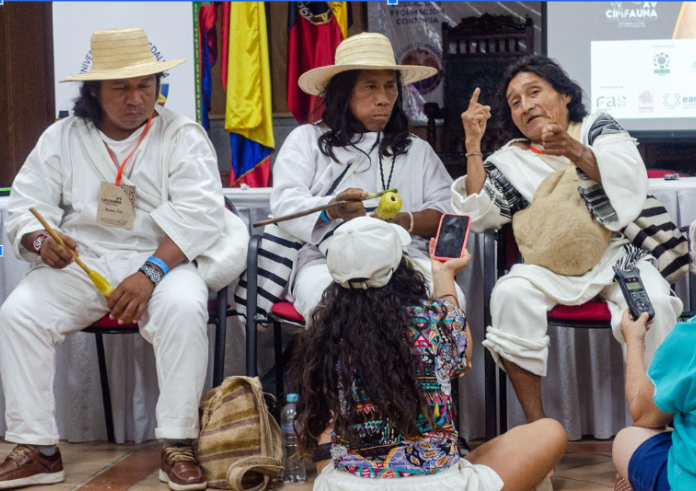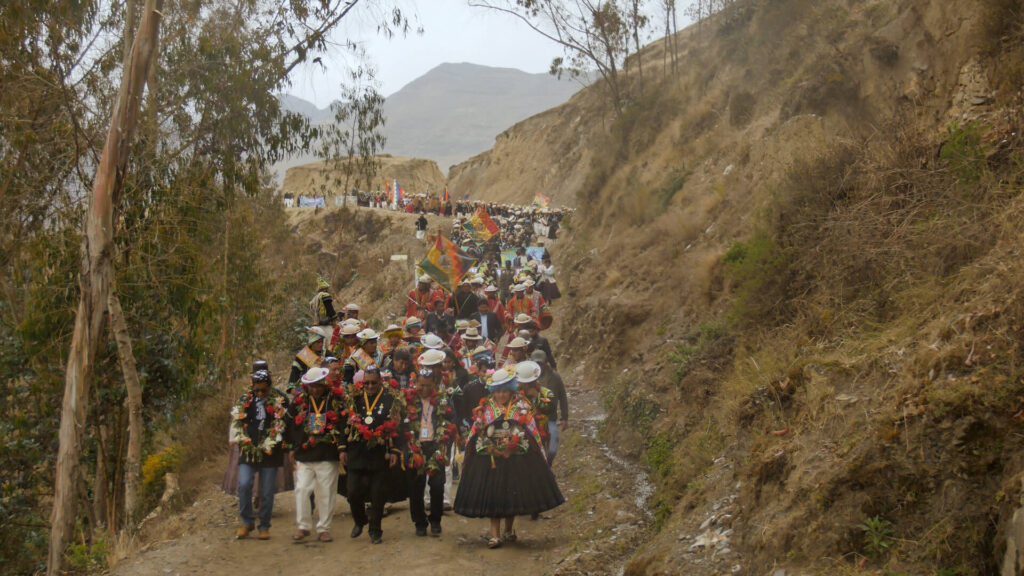Good news! After three long years of labor, we are showing Legacy of the Andes, the long-awaited second part of our Cosmology & Polycrisis (formerly Cosmology & Pandemic) transmedia series, at the Cosmology & Polycrisis website (cosmocrisis.com). All proceeds from the rent and purchase of the films go to support our independent transmedia work to elevate the voices of Indigenous wisdom keepers, land defenders and changemakers throughout the Americas.
In this film and the stories that accompany it, you’ll get to embark with us on a collaborative journey and investigation that examines the responses of indigenous peoples of Latin America to a struggle that shook the world, and their analysis of the multiple crises currently converging on this planet, and indeed, life itself.
Laughing and crying at the same time… FABULOUS FILM! You guys did an amazing job. This is EXCELLENCE! I am ready to pull out all the stops to promote this.
Elizabeth Jenkins. Wiraqocha Foundation founder and Q’eros wisdom keeper (U.S./Peru)
The Esperanza Project, together with the support of the Pulitzer Center on Crisis Reporting and The One Foundation, spent three years working to produce Legacy of the Andes. This epic journey through six ancestral cultures, beginning at the height of the recent pandemic and continuing to the present day.
Para leer este artículo en Español ve a El Legado de los Andes: Un llamado de atención urgente para un mundo en crisis
Portraying rare and intimate footage from isolated communities like Hatun Q’ero, Peru, where the last direct descendants of the Inka live much as they have for millenia, the hour-long film uses the recent pandemic as a springboard for Indigenous perspectives on our current civilizational crisis.
Filmed in six emblematic Indigenous communities, an ancient archaeological site, and major cities in Peru, Bolivia, Chile and Ecuador, Legacy of the Andes helps us to see how traditional lifeways and worldviews hold the key to a shift towards Buen Vivir, or Good Living, an Andean concept that elevates the wellbeing of the planet and all that surrounds us as a major consideration in our quality of life. The protagonists’ critique of Western civilization is an urgent wakeup call to viewers and readers to radically shift our priorities and our way of life before it’s too late.
We started a series of limited special screenings to share the movie among selected audiences, the first one being within the framework of the XV International Congress on Wildlife Management of Amazonia and Latin America at the University of Magdalena, Santa Marta, Colombia on Nov. 22. Besides the presence of biologists, ethnobotanists and other academics of the region, representatives of the indigenous peoples of the area were among the audience, which finished the screening session with a rich exchange triggered by our audiovisual research.
The Cosmology and Polycrisis series and this second episode “The Legacy of the Andes,” leaves us with an emotional lesson and an absolutely clear and forceful message about the importance and power that the traditional knowledge of indigenous peoples has in solving our most complex civilizational problems, such as the recent COVID 19 pandemic, climate change and other upcoming events…
Dra. Emma Estrada Martínez, Investigadora, Universidad Autonoma Chapingo México UACh

In addition to the film, the series includes six in-depth articles taking us deeper into the lives, perspectives and values of each of these emblematic communities, as well as a downloadable 50-page book providing greater context into the lessons learned during the pandemic that share with us practical wisdom to improve our lives in the short term, while preparing for the massive changes that they warn us are coming soon.
The series was created with the help of local and Indigenous film producers and journalists on-site and coordinated by directors and producers Hernán Vilchez in Buenos Aires, Argentina, and Tracy L. Barnett in Guadalajara, Mexico. At the height of the crisis, Barnett and Vilchez reached into more than 20 indigenous communities in six South American countries. Thanks to modern communication technology, they were able to find, empower and work remotely with local teams to tell their stories of resilience and healing.
Vilchez, a professional filmmaker with two decades’ experience working with Indigenous communities around the world, teamed up with Barnett, a veteran environmental and human rights journalist, during the production of the internationally acclaimed 2014 film Huicholes: The Last Peyote Guardians. Together the two formed the nonprofit to support the work of The Esperanza Project magazine (founded in 2009 to cover social change initiatives throughout the Americas) and Esperanza Project TV (founded in 2014 as an international interdisciplinary team producing awareness-raising films and series).
The Legacy of the Andes is the second of this three-part transmedia series. Part I, The Body as Territory, was filmed and reported in three Indigenous communities in Colombia and released in October 2021 at the height of the pandemic. Work has already begun on Part III, Revelation of the Amazon, which likewise draws on local and Indigenous producers and offers interviews and intimate views of original communities throughout Brazil, Ecuador, Colombia and Peru from the early months of the pandemic to the present day.
Follow us, if you can, at any or all of these platforms:
@TheEsperanzaProject (FB)
@the.esperanza.project (Instagram)
@Esperanzaproject (X/Twitter)
@the.esperanza.project (TikTok)
@esperanzaproject (YouTube)
